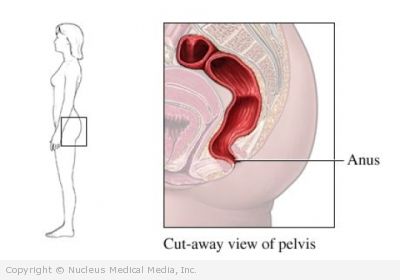Anal wart surgery
(Surgery, Anal Wart; Condyloma Acuminata Surgery; Surgery, Condyloma Acuminata)
Anal wart surgery – Definition
Anal warts are found around and inside the anus. They are caused by certain types of human papillomavirus (HPV). Anal wart surgery is a procedure to remove or destroy anal warts.
Anal wart surgery – Reasons for Procedure
The surgery is done to remove or destroy anal warts if other treatments, like applying medicines, are unsuccessful or not advised. Surgery may also be ideal if there are many warts or if the warts are large. If warts are not removed, they can become bigger and multiply. Warts may also lead to an increased risk of cancer in the affected area.
Anal wart surgery – Possible Complications
Complications are rare, but no procedure is completely free of risk. If you are planning to have anal wart surgery, your doctor will review a list of possible complications which may include:
- Bleeding
- Infection
- Burns
Be sure to discuss these risks with your doctor before surgery.
Anal wart surgery – What to Expect
Prior to Procedure
Your doctor may recommend that you clean out your bowels before surgery. To do this:
- Eat a light lunch and a clear, liquid dinner the day before surgery.
- Do not eat or drink after midnight before your surgery.
- Take any medicines your doctor suggests at the appropriate time.
Also:
- Arrange for a ride home from the hospital.
- Make plans ahead of time for activities after surgery. For instance:
- Do all household chores before surgery or have someone do them for you after surgery.
- Arrange with your job to take about one week off from work.
Anal wart surgery – Anesthesia
Anesthesia will block any pain. Depending on the location and number of warts, you may either have:
- Local anesthesia — numbs the area where the surgery is being done
- Spinal anesthesia — numbing medicine is injected into your back and makes the lower half of your body numb
- General anesthesia — keeps you asleep and pain-free for the procedure
Anal wart surgery – Description of the Procedure
There are different types of surgeries used to remove or destroy anal warts. The type of surgery you will have will depend on different factors, like the number and size of warts. Below is a list of possible procedures:
- Cryotherapy — The wart is destroyed by freezing it with liquid nitrogen.
- Scissor or shave excision — The wart is either cut or shaved off.
- Laser or electrosurgery — A tool uses either a laser or electricity to destroy the warts.
Anal wart surgery – How Long Will It Take?
This depends on the type of procedure that will be used. It may take several minutes for most procedures.
Anal wart surgery – How Much Will It Hurt?
Anesthesia will block any pain during the procedure. After the procedure, you may feel some pain in and around the anus. Your doctor will give you pain medicine to make you more comfortable.
Anal wart surgery – Average Hospital Stay
This procedure is commonly done in an outpatient setting, so you will not need to stay in the hospital. You will be able to go home the day of the surgery.
Anal wart surgery – Post-procedure Care
At the Care Center
Following the procedure, the staff may provide you with pain medicine to make you more comfortable.
At Home
When you return home, do the following to help ensure a smooth recovery:
- Rest, but feel free to move around as long as you feel comfortable.
- Do not do any heavy lifting.
- Do not stand or sit for more than one hour.
- Wear comfortable, loose clothing.
- Do not drive if you are taking pain medicines.
- Eat foods that are high in fiber and drink plenty of fluids. This will prevent straining and constipation.
- Ask your doctor when you are able to have sex again.
Rectal Care
- Take a sitz bath 3-4 times a day and after each bowel movement. You can also sit in a tub of warm water for 10-20 minutes.
- Be gentle when wiping the anal area.
- Clean the anal area after each bowel movement by spraying warm water or using baby wipes.
- There will be reddish-yellow drainage from your rectum for 7-14 days. Wear pads that your doctor gives you to absorb the drainage.
- Even if having a bowel movement is painful, do not avoid going to the bathroom. Your doctor may give you a stool softener to make bowel movements easier.
Anal wart surgery – Call Your Doctor
After arriving home, contact your doctor if any of the following occurs:
- Bleeding in the rectal area that cannot be stopped when applying pressure
- Signs of infections such as fever and chills
- Bad-smelling drainage from the anal area or area where you have stitches
- Stitches break open
- Increased swelling in rectal area
- Pain that is not controlled by the medicine given
- You are not having bowel movements regularly
In case of an emergency, call for medical help right away.

